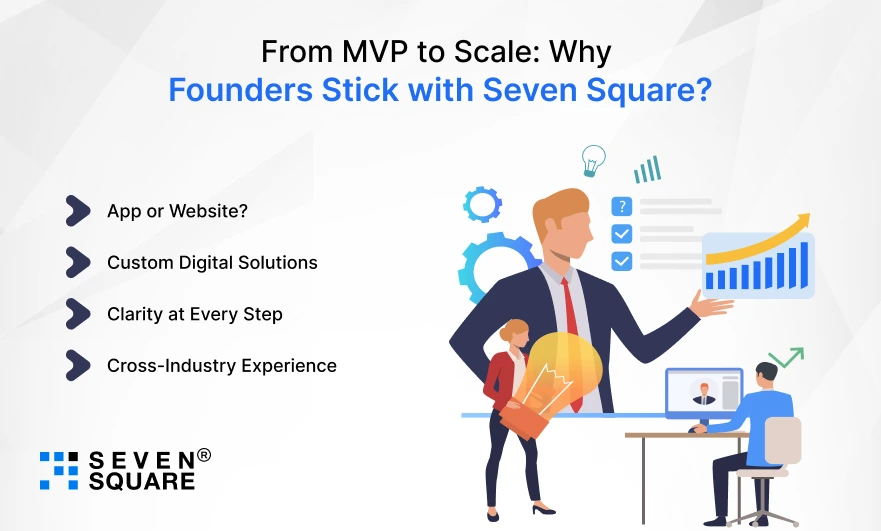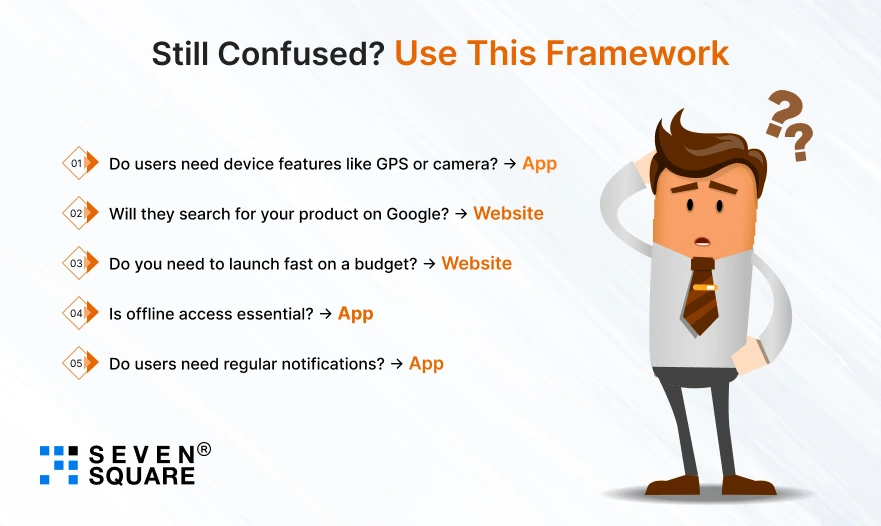Picture This: You’re a startup founder sitting across from an investor.
He leans in and says, “Cool idea. But what’s your first step, an app or a website?”
You pause. You’ve thought about this a hundred times.
Should I build an app or website? What’s better for my business? Will it be scalable? Fast? Affordable?
There’s no single answer, and that’s exactly why so many founders and product managers stall here.
At Seven Square, we’ve helped companies in logistics, healthcare, eCommerce, edtech, and even fintech to come to a decision.
And here’s the truth: it’s not about what’s trendy. It’s about what helps you win.
If you are trying to figure out which is the right digital solution for your business website or mobile app, then this blog is for you.
Here you can learn about the comparison of App vs Website, and which one is best for you.
Why Does This Choice Matters? (App vs Website)
Choosing between a website or mobile app is not just a technical decision; it’s a foundational one that impacts the entire digital strategy of your business.
Whether you’re launching a startup, scaling your SaaS product, or rebuilding a platform, your decision can determine your product-market fit timeline, marketing approach, and long-term maintenance costs.
Here’s why this choice is mission-critical:
- Customer Experience: A mobile-first user base expects fluidity and speed; desktop audiences prefer web interfaces.
- Go-to-Market Speed: Websites are faster to launch, making them ideal for MVPs and early validation.
- Cost: The cost of website vs mobile app can vary drastically. A custom mobile app will almost always require more budget.
- Future Proofing: Starting with the wrong platform could mean redoing the entire product later.
At Seven Square, we’ve seen this play out across industries.
A logistics firm needed a mobile app for field agents, while a B2B SaaS client thrived with a responsive website.
Your answer is in your audience, goals, and how you plan to scale.
App vs Website: Understand the Core Differences
Before deciding, you need to truly understand the differences between an app and a website. Each platform offers unique capabilities and limitations.
Key Benefits of a Website:
- Accessibility: Anyone with internet access can use it, no downloads.
- SEO Discoverability: Websites are Google-indexed, allowing organic reach.
- Cost-Efficient: Lower development and maintenance costs.
- Speed: Ideal for fast iterations, especially during the MVP phase.
- Cross-Device Friendly: One build works across desktop, tablet, & mobile.
When a Mobile App is Better:
- Device Access: Use native features like camera, GPS, accelerometer.
- Push Notifications: Direct communication with users increases retention.
- Offline Functionality: Serve users even without the internet.
- Speed & Performance: Optimized for specific device capabilities.
- Repeat Usage: Better engagement for apps used frequently.
These app vs web solution pros and cons can help you understand which experience best serves your users.
The technical route you choose should match your product’s mission.
When to Choose a Website First?
Many startups and SMBs begin their journey wondering, “Do I need an app or website for my business?” In most early stages, a website is the smarter choice.
Choose a website if:
- You want to be found on Google (websites = SEO-friendly).
- You’re validating a new idea with a low-cost MVP.
- You sell services, bookings, or content.
- Your user base is likely to visit from a desktop.
- Your team wants to launch quickly and iterate often.
Examples of Website-First Use Cases:
- SaaS dashboards
- eCommerce platforms
- Appointment and booking tools
- Marketing and landing pages
Real Case: EdtMayer A Certified Management System
We helped to build a fast, responsive web solution where clients can have real-time updates and a custom admin panel.
95% of their users accessed the platform via desktop. The client saved time and tens of thousands in costs by not building a mobile app prematurely.
If your goal is discoverability, fast iterations, or content-first delivery, then a website is almost always the best first step.
When a Mobile App Is the Smarter Bet?
Now let’s talk about when to go mobile. Building an app is a bigger investment but offers deeper user engagement. So, when should you take that step?
Choose a mobile app if:
- Your users are on-the-go or mobile-first (like delivery agents or young consumers).
- You require native device access (GPS, camera, biometrics).
- You want to increase engagement through push notifications.
- Offline access is important.
Common App Use Cases:
- Logistics & fleet tracking
- On-demand services (ride-share, food delivery)
- Social networking platforms
- Fitness or health tracking
Real Case: CountMee Logistics App
We built a mobile app for a logistics company to manage thousands of drivers.
They needed multi-location delivery, batch delivery management, a multi-point delivery system, and real-time route updates.
Building a mobile app allowed them to reduce delivery errors by 32% in just 6 weeks.
Ask yourself: “Will my users return frequently? Do they need the app every day?” If yes, then a mobile app offers the best user experience.
What is the Cost of Website vs Mobile App?
Let’s explore the cost difference between mobile app and website development.
Website:
- Simple Website: $2,500 to $5,000
- Dynamic Website or Web App: $4,000 to $6,000
Mobile App:
- Single Platform (iOS or Android): $6,000 to $10,000
- Cross-Platform / Native (Both): $5,000 to $8,000
Why is app development costlier?
- Requires design + development per OS (iOS/Android).
- Testing and QA take longer.
- Requires publishing and updating through App Stores.
Bonus Tip:
- At Seven Square, we often recommend building a responsive web app first to validate ideas.
- Later, transition into a full-fledged native mobile app if the traction justifies the investment.
- This hybrid approach saves costs, validates real user behavior, and avoids expensive missteps.
App vs Website: SEO & ASO Considerations
Visibility is important. Whether you want to dominate Google search or App Store rankings, how you approach discoverability changes based on your platform.
Website Benefits:
- Indexed by Google = higher organic traffic.
- Easier to backlink and share content.
- Ideal for blogs, marketplaces, and service platforms.
App Discoverability (ASO):
- You rely on App Store Optimization techniques.
- Success depends heavily on reviews, downloads, and keyword optimization.
- Requires a separate marketing funnel for iOS and Android.
If search traffic is your growth lever, always go with a website or web app.
If retention and mobile UX matter more, a mobile app strategy is better.
Pro Tip: We’ve helped brands use both SEO and ASO effectively.
One startup used its blog-heavy website to drive awareness, while the app focused on converting those users into loyal, returning customers.
What About Web Apps or Progressive Web Apps (PWAs)?
If you’re stuck between both worlds, there’s a powerful middle path: Progressive Web Apps (PWAs).
Why Choose a PWA?
- Works offline (like an app).
- Can be installed on phones.
- Uses push notifications (Android).
- No App Store approvals needed.
- Lower cost vs native mobile apps.
We’ve used PWAs to help clients in education and retail launch interactive apps without spending six figures on native builds.
When to pick a PWA:
- You need an app-like experience.
- You want to launch quickly.
- You don’t want App Store limitations.
From MVP to Scale: Why Founders Stick with Seven Square?

When it comes to choosing between a mobile app or website, what you really need is a team that gets your business goals.
At Seven Square, we don’t just ask “What do you want to build?” We ask, “Why now, and how can we make it work faster, better, and smarter?”
We’ve helped startups and enterprises alike choose the right tech solution, whether it’s a fast website, a full-featured mobile app, or a hybrid like a progressive web app (PWA).
- App or Website?: We don’t push what’s easiest for us; we help you decide what brings results. Whether it’s a website for your MVP or a native mobile app for long-term scalability, we’ve done both.
- Custom Digital Solutions: Every product we build is created from scratch. We specialize in custom mobile apps, enterprise-grade web platforms, and responsive PWAs.
- Clarity at Every Step: Clear timelines and transparent communication. Whether you’re choosing between web app vs native app, or calculating the cost difference between mobile app and website, we make it clear.
- Cross-Industry Experience: We’ve delivered platforms for logistics, healthcare, fintech, education, retail, SaaS, and beyond, each with its own unique tech stack and user base.
Want a Website or Mobile App? Contact Us Now!
Quick Decision Checklist
| Feature/Need | Go Website | Go App |
|---|---|---|
| Push Notifications | No | Yes |
| Device Features (Camera, GPS) | No | Yes |
| Quick Launch/Lower Budget | Yes | No |
| Frequent Content Updates | Yes | No |
| Offline Functionality | No | Yes |
| Targeting App Store Users | No | Yes |
| Early MVP + Iterate Fast | Yes | No |
Still Confused? Use This Framework

Here’s a simple decision tree you can use to choose between an app vs website:
Ask Yourself:
- Do users need device features like GPS or camera? → App
- Will they search for your product on Google? → Website
- Do you need to launch fast on a budget? → Website
- Is offline access essential? → App
- Do users need regular notifications? → App
This framework has helped our multiple clients to avoid expensive misalignment. Think about the user first.
FAQs
- If you’re just starting out, building a website is often the smarter choice.
- It’s faster, more cost-effective, and helps with SEO so people can find you on Google.
- Once your product gets popular, you can scale into a mobile app for better engagement.
- The key difference between an app and a website is that apps run natively on a mobile device and can access features like GPS, camera, and push notifications.
- Websites are browser-based and great for accessibility and search visibility.
- A Progressive Web App is a hybrid between a website and a mobile app.
- It works offline, supports push notifications, and can be installed on phones without needing app stores.
- PWAs are great for fast MVPs and lower app development costs.
- Yes, and it’s common. Many startups build a responsive website first, then repurpose core functionality into a native app or PWA.
- Frameworks like Flutter or React Native also allow you to reuse logic across platforms.